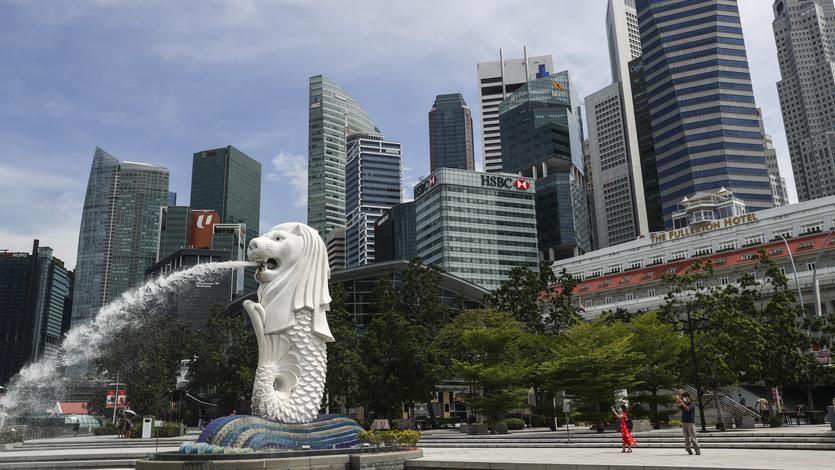 People are dwarfed against the financial skyline as they take photos of the Merlion statue along the Marina Bay area in Singapore, June 30, 2020. (YONG TECK LIM / FILE / AP)
People are dwarfed against the financial skyline as they take photos of the Merlion statue along the Marina Bay area in Singapore, June 30, 2020. (YONG TECK LIM / FILE / AP)
SINGAPORE - Singapore's economy grew faster than official forecasts in 2022 but slower activity in the fourth quarter points to significant risks ahead for the city-state in the new year as global demand weakens and inflationary pressures weigh.
Singapore's economy grew 3.8 percent in 2022, preliminary data from the Ministry of Trade and Industry showed on Tuesday, beating government forecast for growth of 3.5 percent and down from 7.6 percent in 2021.
Gross domestic product expanded 2.2 percent in October-December on a year-on-year basis, the government data showed, almost half the 4.2 percent growth seen in the third quarter. Eight economists polled by Reuters had expected growth of 2.1 percent.
"It is concerning that there is a slight quarter-on-quarter fall in services … this showed the impact of the global slowdown on external oriented services sectors, and that further growth from current levels will be harder to achieve in 2023," said MUFG analyst Jeff Ng.
Singapore Prime Minister Lee Hsien Loong said in his New Year message on Saturday that the international outlook remains troubled, which will affect the city-state's economy. The government expects growth of between 0.5 percent to 2.5 percent this year
GDP grew 0.2 percent on a quarter-on-quarter seasonally adjusted basis in October-December.
Singapore Prime Minister Lee Hsien Loong said in his New Year message on Saturday that the international outlook remains troubled, which will affect the city-state's economy. The government expects growth of between 0.5 percent to 2.5 percent this year.
ALSO READ: S'pore's Wong cements prospect of becoming PM with party post
Inflation
Singapore has seen some signs of price pressures easing in recent months but inflation still remained elevated at about 5 percent.
Meanwhile, the country's sales tax has been raised to 8 percent from 7 percent since Jan 1 this year as the government needs more revenue to fund increasing healthcare expenditure of its aging population. The sales tax will be further raised to 9 percent from 2024.
Singapore's government has pledged to give almost 3 million Singaporeans at least S$700 in cash payouts over five years as part of an S$8 billion "assurance package" to help them cope with rising prices.
Capital Economics said the economy is likely to struggle, which means the Monetary Authority of Singapore is unlikely to tighten monetary policy in 2023. The central bank tightened its foreign exchange-based monetary policy four times last year to fight rampant inflationary pressures.
READ MORE: Singapore reports 1,017 new COVID-19 cases
"Looking ahead, we think growth is likely to weaken further. Exports are likely to fall further if, as we expect, the global economy enters a recession in 2023," Capital Economics said. "Elevated interest rates, declining household savings and high inflation are likely to drag on domestic demand."


